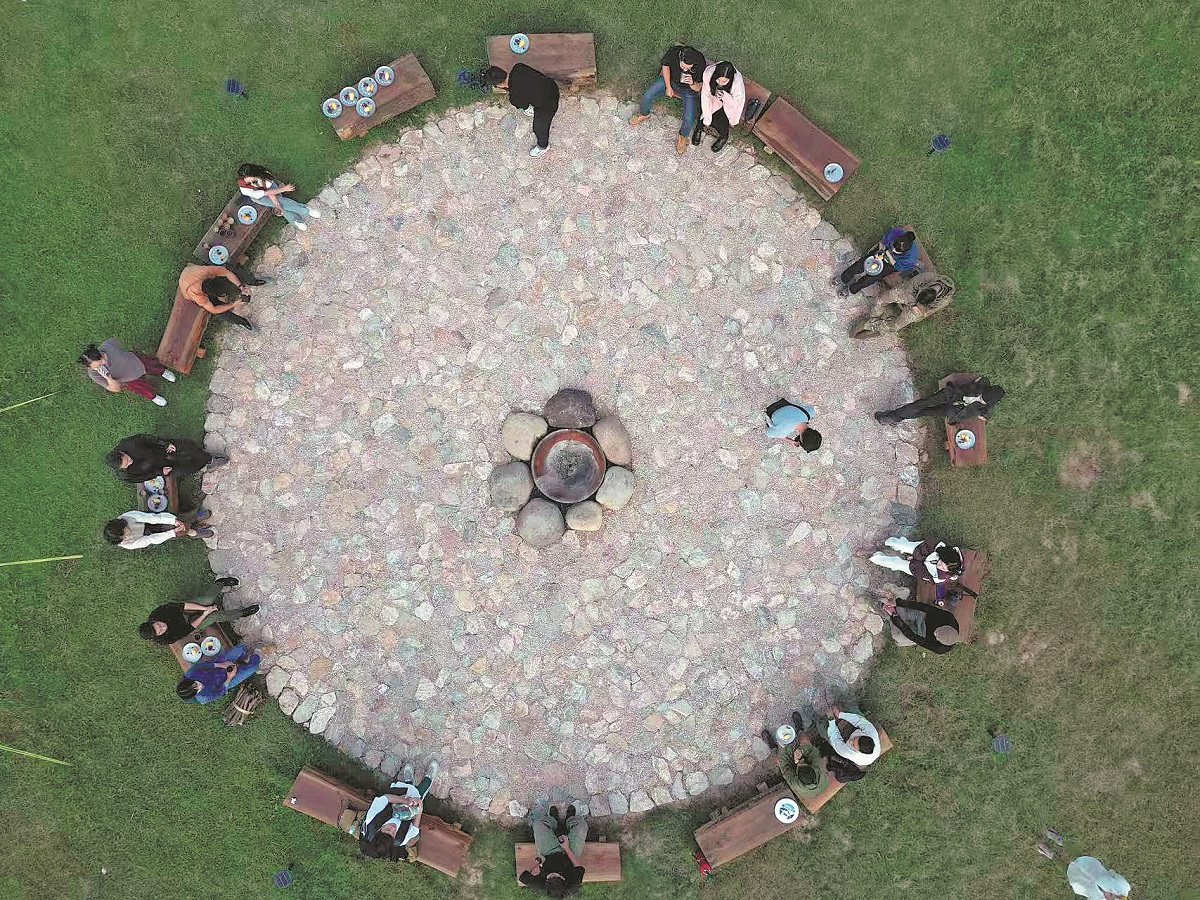Jaded city visitors refreshed by Anji county's natural highs
Rural getaway transformed in 20 years since Two Mountains theory outlined


Cycling hub
Cycling has exploded in popularity among young people in recent years, and Anji has become a magnet for riders thanks to its smooth road surfaces, challenging climbs, and picturesque scenery.
Located beside rice paddies in Yinkeng village, Tianhuangping town, OKKA Cycling Club's striking blue building stands out. It was designed by a foreign architect invited by club founder Zhuo Li who integrated her own aesthetic preferences.
The Blue House, as it's known, serves as the club's base, housing a cafe, guest rooms, public showers, a bike garage, and a rooftop terrace — providing a one-stop hub for rest, refueling, and community gatherings.
"Tourism often creates artificial experiences. But cycling brings people into the real countryside — into villages and forests — allowing them to experience the genuine changing of the seasons and rural life," Zhuo said. "For those who love nature and the outdoors, a bicycle is a bridge to the countryside."
Originally from Yunnan province and raised in Sichuan province, she studied and worked in Belgium and the Netherlands. She later returned to China and worked in Shenzhen, Guangdong province, and then Shanghai before settling in Anji.
Her first visit to the county in the spring of 2019 left a lasting impression. "The air and views here are incredible. You don't need to travel abroad to find natural beauty," she said.
Anji's location in the Yangtze River Delta makes it highly accessible, and it's only 2 to 3 hours by car from cities like Shanghai, Suzhou and Hangzhou.
During China Daily's visit to OKKA last month, a group of riders left Suzhou at 6 am, arrived at the Blue House by 9 am, cycled until 3 pm, and returned to Suzhou.
"Our decision to settle here was driven by demand," Zhuo said. "The most passionate cycling community in China is in the Yangtze River Delta, and they need scenic, high-quality routes. Zhejiang's countryside excels in both nature and infrastructure," she said.
Wang, Party secretary of Yucun village, believes the emergence of new rural industries owes much to young people returning home. "Wherever rural development happens, young people are key. They bring back their lifestyles, needs, ideas, and creativity, which can unlock dormant local resources," Wang said.
Data shows that in the past three years, more than 48,000 young people have chosen to put down roots in Anji, bringing with them passion and creativity.
At Xiaohangkeng campsite in Xiayang village, a clear lake and green lawn entice visitors to set up their tents, sip coffee or tea, and enjoy gourmet food. Once isolated and underdeveloped, the village now earns over 12 million yuan a year in tourism revenue thanks to Bao Xin, the village Party secretary who was born after 1985.
His "Three Nos" concept — no trace left, no worry, no boundary — has driven the transformation.
"We live with nature. 'No trace' means protecting the environment. 'No worry' means visitors feel carefree. 'No boundary' means no separation between people and nature — or between ideas and development," Bao said.
Architect Chen Gu shares a similar vision. He is the founder and chief designer of Xiaoyin Half Day Village in Lingfeng National Tourist Resort. Once abandoned, Hengshanwu village is now a creative hub combining cultural heritage with boutique accommodations. Spanning 161 acres, the area features over 70 restored buildings and 19 distinctive bed-and-breakfasts.
From 2013 to 2016, the area underwent infrastructure upgrades. Chen preserved the village's terrain and vegetation, designing around its natural topography.
"There were no towering peaks, but the land had character," he said. "We retained all the original buildings and plants."
After completing renovations, Chen recruited a team of hosts to manage the B&Bs. The village has become a popular destination after opening in October 2017.
By the end of 2024, it had welcomed over 1 million visitors and generated 110 million yuan in annual revenue.
Zhang Min'er is one of the B&B hosts. She runs the Jam Guesthouse, known for its home-style cooking and natural surroundings.
Since it opened, it has expanded from seven rooms to 13, but maintained a simple rustic design that emphasizes harmony between people and nature. Both the front and back yards of the property are lush with attractive plants, which Zhang tends to every day.
"People who've spent too much time in the city get aesthetically fatigued by all the overly polished places. What they really want is something simple, more minimalist, so they can truly relax," she said.
Chen said last year the venue hosted more than 1,900 study tours, and in 2023 hosted over 2,200. "Groups from Southeast Asia, Taiwan, and Hong Kong now come frequently," he said.
























